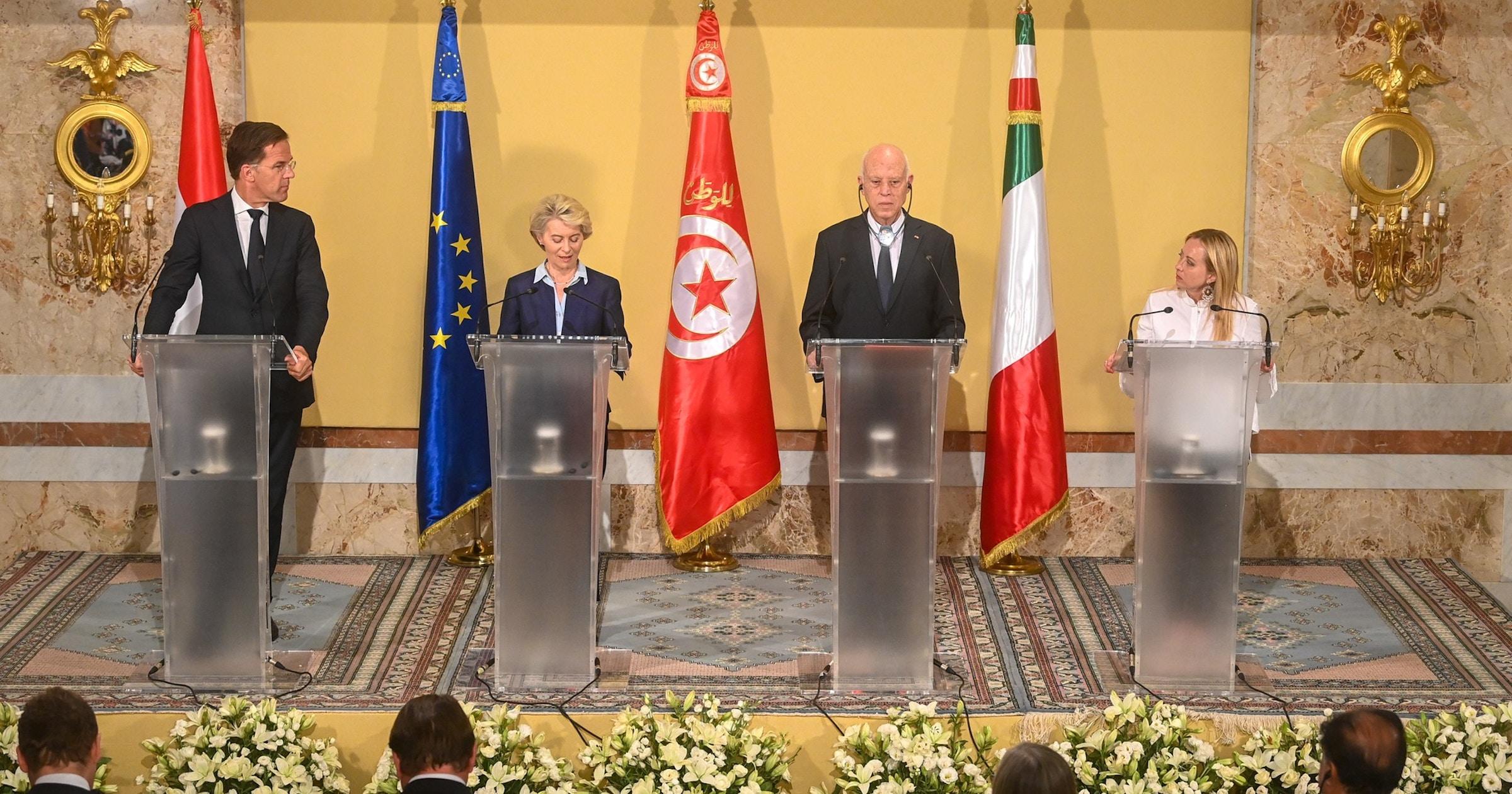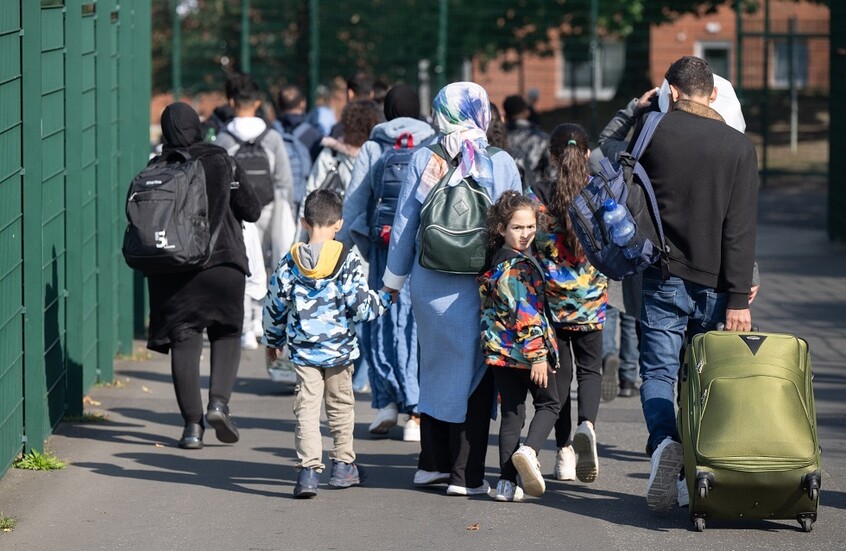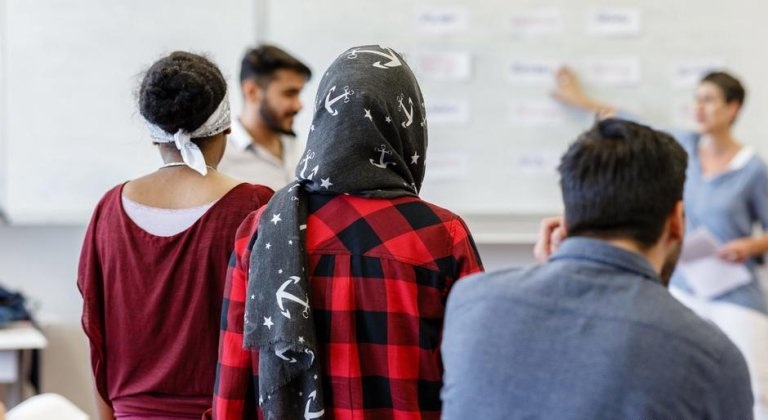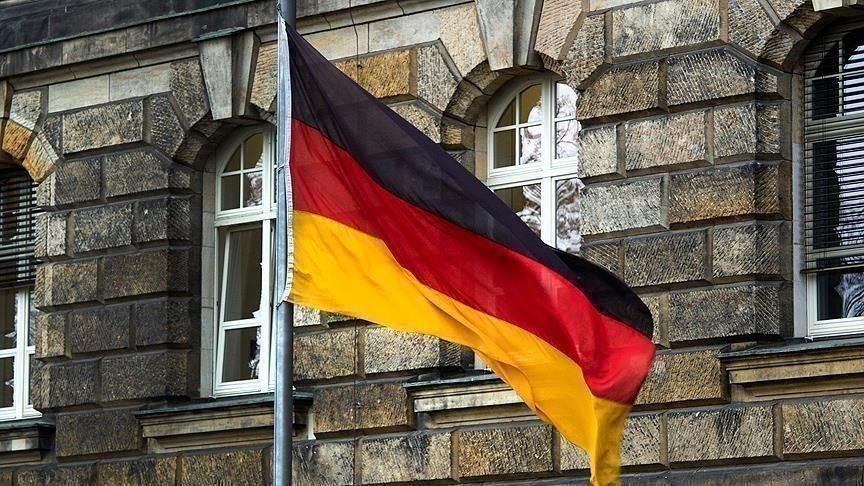
Written by: Taha Ali
Nobody desires to depart from their place of birth and upbringing unless they encounter injustice and deprivation of human dignity. People aspire to seek out a location that honors their humanity, preserves their dignity, and fulfills their dream of living as fully realized human beings.
Reports indicate that immigration rates to Europe are constantly increasing, despite its support for tyrannical regimes in Africa and the Arab region, playing the role of gatekeeper, preventing refugees from arriving at its doors.
It seems like a puzzle that has no solution, as many European governments say that we will confront our failure to prevent migration by adopting the same policies that deepen this failure. Which means wasting more time going in the wrong direction.
If only the matter stopped at the sin of ‘wasting time,’ but tens of thousands of migrants seeking refuge from the land of fear and poverty pay the price for these ‘disastrous’ policies as they pursue an ‘alternative opportunity.
Extremist European governments, or those seeking to undermine far-right movements, deploy all their weapons to halt immigration, viewing it as an impending ‘invasion’ and a threat to the ‘white civilization,’ considering it a cause of their deep economic and social crises.
Things have reached a point where the British Foreign Secretary, in September, expressed her intention to move beyond the refugee agreement, considering it “no longer in line with the current era’s conditions.”
The United Nations Refugee Convention, which Britain intends to overturn – and will not be the last one – has defined the legal term ‘refugee’ and established the rights of refugees.
European governments are cutting their spending on migrants through various means, putting their lives at risk. According to humanitarian organizations, this has led to a situation where the duty to save refugees from drowning in the Mediterranean Sea is being overlooked.
In a statement issued on September 14th, the Hellenic League for Human Rights reported that 40 survivors of one of the deadliest boat sinkings in the Mediterranean in recent years have filed a legal complaint. They allege that ‘Greek authorities did not act promptly and failed to organize a timely and suitable rescue operation for those aboard the boat.’
The boat sank off the coast of Greece in June while carrying between 400 to 750 individuals from Pakistan, Syria, and Egypt. Only approximately 104 men survived among the migrants.
CNN had previously conducted an investigation in which it reported testimonies from survivors of the boat disaster and their relatives that cast doubt on the Greek Coast Guard’s account of events. This suggests that more lives could have been saved.
Supporting tyrants. Search for the interests
Despite all these measures, the European Border and Coast Guard Agency, Frontex, announced last May that the European Union may witness another record number of individuals seeking to reach its borders this year through illegal means, with more migrants driven by reasons such as poverty and climate change rather than conflict.
Frontex reported that since the beginning of 2023, the number of individuals attempting to reach European shores from North Africa through Italy has risen to over 42,000, marking a 292% increase between January and April compared to the same four months in 2022.
On the other hand, Hans Laitenberger, who assumed the presidency of Frontex last March, stated that the number of migrants from Sub-Saharan Africa is on the rise, indicating a shift in the reasons for migration, with more people being driven by the desire to escape poverty and climate change rather than conflict. He added that ‘this year may see another record number.’
On the other hand, Hans Leijtens, who became the executive director of Frontex last March, stated that the number of migrants from Sub-Saharan Africa is on the rise, indicating a shift in the reasons for migration, with more people being driven by the desire to escape poverty and climate change rather than conflict. He added that ‘this year may see another record number.
Leftist and human rights organizations believe that one of the most significant reasons for the influx of refugees is Europe’s support for oppressive and corrupt rulers in Africa and the Arab region. This hinders genuine development in these societies, which could serve as an incentive for millions of young people to stay in their countries without fear or imprisonment.
According to observers, Europe has initiated efforts to enhance its ties with Tunisian President Kais Saied, who disrupted the democratic experiment on July 25, 2021. This experiment had been a source of hope and inspiration for millions in the Arab region after a period of cautious opposition and friendly criticism.
In July of the past year, the Tunisian president, now functioning as a dictator, centralized all authorities in his hands. He signed a memorandum of understanding with the European Union, partly aimed at curbing irregular migration. However, this has drawn human rights criticisms due to what has been described as the ‘inhumane’ treatment of migrants from Sub-Saharan African countries by Tunisian authorities in recent times.
The ‘Strategic Partnership’ agreement also encompassed other areas, including economic development and renewable energy. Following the announcement of the agreement, which was signed in Tunisia, the President of the European Commission, Ursula von der Leyen, pledged to enhance and elevate cooperation in border management and search and rescue operations.
Furthermore, Italian Prime Minister Giorgia Meloni stated that the agreement represents a significant step towards a genuine partnership to address what she describes as the ‘migration crisis.’
However, the EU’s agreement with Tunisia has also drawn criticism for the recent actions of Tunisian authorities towards migrants from Sub-Saharan African nations.
These migrants, among them women and children, were abandoned in the desert, exposed to harsh conditions without access to water or food. According to testimonies gathered by the French news agency via phone and videos received from non-governmental organizations in Tunisia.
The memorandum of understanding allocates 15 million euros out of a total of 105 million euros for the ‘voluntary’ return of approximately 6,000 migrants from Sub-Saharan African countries in Tunisia to their home countries.
Karl Kopp, who leads the Europe department at the German organization “Pro Asyl” which advocates for refugee rights, expresses concern, stating, “We see a partner of the European Union acting based on a hate speech against refugees from the Greater Sahara. We see that hundreds of people have been abandoned in the desert heading towards Libya,” and he adds, “One cannot expect anything positive from a deal under these circumstances. It is evident that it involves a dictator intercepting boats of migrants heading for Europe.”
Ramadan Ben Omar, the spokesperson for the Tunisian Forum for Economic and Social Rights, characterizes the agreement as a “unilateral European perspective.” Speaking to the media, he noted that the memorandum of understanding was signed under “undemocratic” conditions, alluding to the actions of President Kais Saied, who has imposed growing restrictions on rights and democratic institutions.
Ben Omar stresses that the primary concern for Europeans is the mitigation of irregular migration, and he perceives that the presence of an extensive economic support program for Tunisia in the proposed agreement serves primarily as a cosmetic measure. On the other hand, Tunisian journalist Mounia Ben Hamadi described the agreement as being “between the European Union and one person,” criticizing what she perceives as the “migration deal” lacking the necessary political legitimacy.
Despite these criticisms, the European Union is seeking to establish a similar partnership with regimes that have a dark record in human rights, such as Egypt and Morocco, concerning migrants. Ursula von der Leyen, the President of the European Commission, stated that she wants this partnership to serve as a model for future agreements with countries in the region.
According to The Independent, the European Union may seek a new comprehensive partnership with Egypt that includes measures to curb irregular migration and undermine inhumane human trafficking networks.
On the other hand, Egyptian President Abdel Fattah al-Sisi once again warned in September 2023 about the consequences of population growth in Egypt, describing it as catastrophic.
President Sisi suggested the idea of organized labor migration from densely populated countries to regions with lower population densities, including Europe.
Although he also came to power through a military coup in 2013, Sisi encountered only mild opposition from Washington and European capitals, and this resistance quickly faded as arms deals, particularly with Germany and France, continued to progress.
As an example, Egypt was among the list of top countries receiving permits for arms exports from the German government during the first ten months of 2021.
The German Ministry of Economy’s response to a parliamentary inquiry by Sevim Dağdelen, a member of the Left opposition party, in November 2021, reveals that Egypt was the top-ranked country in terms of its demand for German weapons and military equipment during the first quarter of 2021, with purchases totaling 290.6 million euros. However, it subsequently dropped to third place in 2021, with purchases amounting to 802 million euros.
Observers believe that Western governments backed authoritarian rulers in Arab countries because they believed that the best way to serve their interests in the region was to align with these dictatorial leaders, who promised a false sense of “stability.” This choice was preferred over engaging with elected governments filled with uncertainties.
In addition to the Western belief in these rulers’ ability to combat terrorism, the issue of torture by these dictators and their suppression of their people has become secondary, often ignoring the fact that such repression typically increases support for extremist and violent groups.
Just as the West saw Arab autocrats as the most viable means to ensure a continuous flow of oil. Simultaneously, the enormous profits from oil gave these tyrants repressive means, enabling them to retain power without facing accountability from their tax-paying citizens.
Search for the history
However, experts also hold Europe historically responsible for the economic deterioration in Arab and African countries. One of the most prominent figures among them is Professor Otino Lumumba, a Kenyan law professor and the head of an anti-corruption organization.
Lumumba believes that a pivotal moment in the struggle for control over Africa’s resources was the 1885 Berlin Conference, which resulted in the partitioning of the continent among colonial powers during the late 19th century.
In this manner, those who did not have the ownership rights of the African countries divided it among the occupiers, with 14 nations attending the division conference. As a result, European colonial empires hurried to seize the remaining regions of the African continent and penetrate its interior. This phase culminated in Italy’s fascist occupation of Libya in 1911 and France’s occupation of the Far Morocco in 1912. Consequently, seven European countries, namely Britain, France, Italy, Germany, Portugal, Spain, and Belgium (whose combined area was 734,000 square miles), came to dominate 93% of Africa (with an area of 11,300,000 square miles), equivalent to 15 times the combined area of these European nations. There remained only one independent state in all of Africa, which is Ethiopia.
After African and Arab countries gained their independence, the tools of the new global system, such as the International Monetary Fund and the World Bank, continued to play their role in further impoverishing the people and entrapping them in the debt spiral. Therefore, the vicious cycle continues, only leading to the influx of vast numbers of people.
These individuals risked their lives by fleeing across the sea to Europe from the authoritarian regimes that Europe supported and nurtured in Africa.
Rather than Europe actively investigating the underlying causes that compel these individuals to perilously seek a new life at sea, it continues to support authoritarianism and corruption in African nations. It sometimes even overlooks the oppressive actions of regimes aligned with its interests and then calls upon them to collaborate in preventing immigration!





